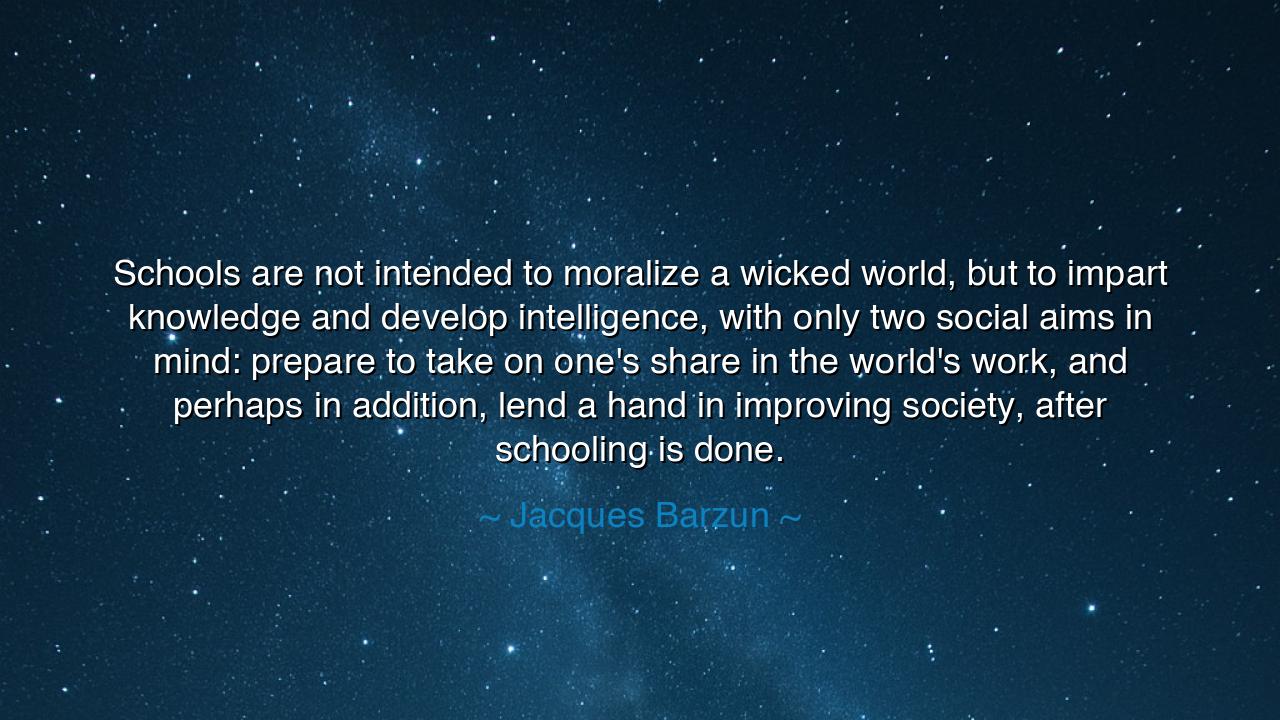
Schools are not intended to moralize a wicked world, but to
Schools are not intended to moralize a wicked world, but to impart knowledge and develop intelligence, with only two social aims in mind: prepare to take on one's share in the world's work, and perhaps in addition, lend a hand in improving society, after schooling is done.






The words of Jacques Barzun, scholar and historian, speak with the calm authority of one who has peered into the heart of civilization: “Schools are not intended to moralize a wicked world, but to impart knowledge and develop intelligence, with only two social aims in mind: prepare to take on one’s share in the world’s work, and perhaps in addition, lend a hand in improving society, after schooling is done.” Beneath these words lies a truth both simple and profound — that education is not a sermon, but a crafting of the mind; not a refuge from the world’s corruption, but a forge in which each soul is tempered to meet the labors and responsibilities of life. Barzun reminds us that the purpose of schooling is not to sanctify humanity through slogans, but to equip it through understanding — to awaken intelligence and prepare each person to contribute meaningfully to the greater whole.
In the wisdom of the ancients, this idea was well understood. The Greeks did not build their schools to cleanse the sins of men, but to teach them how to think. For Socrates, education was a dialogue with truth, not a campaign for virtue. Virtue, he believed, followed from knowledge — from the ability to reason, to question, to discern. So too did Confucius, in distant China, teach that moral order arises not from imposed preaching, but from cultivated understanding. The role of education, then, is not to moralize, but to awaken. The teacher’s task is not to dictate what is good, but to kindle the light by which good and evil may be seen clearly.
Barzun’s words carry a subtle warning against the arrogance of using education as a tool of moral indoctrination. When schools seek to reform the world before they have enlightened the mind, they reverse the natural order of growth. A young mind, untrained in reason and inquiry, cannot bear the burden of ideology without being twisted by it. Knowledge must come first; from it springs judgment, and from judgment, moral strength. It is not the duty of the school to preach righteousness, but to give the tools by which righteousness may be understood and chosen freely. For an unthinking virtue is no virtue at all — it is obedience in disguise.
Consider the example of Horace Mann, the 19th-century pioneer of American public education. He saw in schooling a means not to moralize, but to empower. He believed that knowledge was the true foundation of democracy — that a people educated in science, letters, and reason could govern themselves wisely and resist tyranny. Mann did not demand that schools shape saints, but that they form capable citizens, prepared for the world’s work and equipped to improve it through their labor and intellect. His vision echoed Barzun’s later insight: that the highest purpose of education is not to separate the good from the wicked, but to make every man and woman a competent builder of the common good.
The first of Barzun’s social aims — “to take on one’s share in the world’s work” — reminds us that knowledge is not an ornament, but a responsibility. Learning without service is like a lamp hidden under a bushel. Each person, through education, inherits a portion of humanity’s ongoing labor — to sustain life, to create, to heal, to govern, to teach. To know something is to owe something: a debt to use that knowledge in service of the world. But the second aim, “to lend a hand in improving society,” lifts this duty higher — it is not enough merely to work; one must strive to better what one inherits. This is the sacred rhythm of civilization: each generation, through the wisdom of the past, building a more enlightened future.
Yet, Barzun’s tone is not one of idealism without ground. He does not promise that schools can save the world, nor that knowledge alone will banish wickedness. Rather, he reminds us that education must prepare, not perfect. The school is the beginning, not the end, of moral life. The improvement of society is the work of the educated soul, not of the institution itself. Schools plant the seed; the grown mind must tend the garden. It is a call to humility — for teachers, to remember their purpose, and for students, to recognize their duty.
Therefore, the lesson of Jacques Barzun’s words is timeless: education is not a moral crusade, but a sacred apprenticeship to wisdom. It teaches us to think, to discern, to act with intelligence and grace in a complex world. The good society cannot be lectured into existence; it must be built by hands trained in thought and hearts guided by understanding. So let every learner remember — you are not in school to be made good, but to be made capable of doing good. And when your schooling is done, let your knowledge not lie idle, but be turned outward — toward your craft, your community, your civilization — that through your effort, the world may be just a little wiser, and a little more whole, than when you found it.






AAdministratorAdministrator
Welcome, honored guests. Please leave a comment, we will respond soon